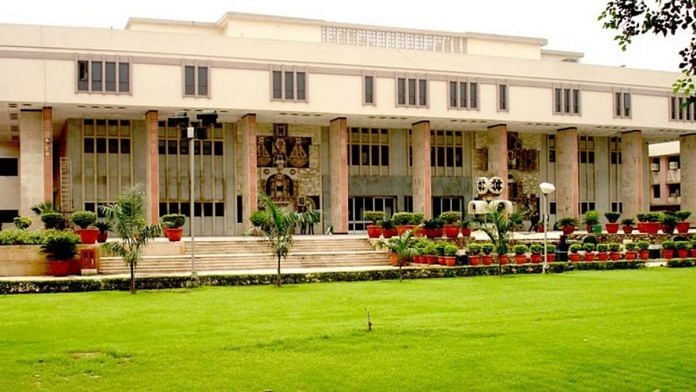New Delhi: Calling judicial delays in India’s Constitutional courts “a sorry state of affairs”, the Delhi High Court said this week that the situation forces poor labourers “to fight tooth and nail to get justice”. The court was hearing a two-decade-old appeal by Delhi’s Safdarjung Hospital in a case of wrongful termination.
In its petition, the government hospital had appealed against a 2002 labour court order, which held that a pump operator, Nishikesh Tyagi, had been wrongfully terminated and reinstated his services.
Ever since, although the case was mentioned 39 times before the HC, it did not see a logical conclusion. The remarks come at a time when judicial delays have been the cause of debate in the country.
In its ruling on 20 Febuary, the single-judge bench of Justice Chandra Dhari Singh dismissed the appeal and said that labour court’s order was “trite in law” and did not require any interference by the court.
Trite laws are laws that are obvious or common knowledge.
Despite no irregularity with the order, the petitioner had to fight “tooth and nail for over two decades to obtain a final decision”, the court said.
“Such a situation of gross delay can only be termed as a sorry state of affairs in the Constitutional courts of this country, where the poor laborers are forced to fight tooth and nail to get justice for themselves,” the single-judge bench of Justice Chandra Dhari Singh said, adding that the delay leads to “poor litigants losing faith in the justice system.”
The delay of over two decades has left the petitioner in a state of uncertainty, where litigants find themselves trapped in a never-ending cycle, the judge said.
“In the instant case, despite a favourable award, the respondent workman has been moving from pillar to post to get it implemented and the same defeats the entire purpose of granting him a relief in the first instance.”, Justice Singh said, adding that it was high time that courts step up to give speedy justice to citizens.
“Swift and efficient justice is a fundamental right and a cornerstone of a democracy,” Justice Singh said.
Judicial delays have been a topic of worry among law experts in India for some years now. According to a report from the Centre for Research and Planning of the Supreme Court of India — released in December — there are 5.05 crore pending cases, handled currently by 20,580 judges working at all levels of the judiciary.
Judicial vacancies have often been cited as one of the major reasons for judicial delays. According to the same report, as of 1 October, there were 347 vacant judges’ posts (31 percent) in the high courts against the sanctioned strength of 1,114 judges.
Also Read: All-India Judicial Service exam will challenge dynastic sway in judiciary. But SC is silent
The arguments
According to the court order, Tyagi worked as a casual and daily worker as a pump operator in Safdarjung Hospital from 1985 until his services were terminated in May 1991.
He appealed the dismissal before the Delhi State Government under the Industrial Disputes Act 1947 — the law that protects workmen against such illegal termination by industries.
The state government, in turn, referred the issue to the Karkardooma Labour Court, which, in 2002, reinstated Tyagi’s services and ordered the hospital to pay him Rs 3 lakh in back wages.
Safdarjung Hospital then appealed the order in Delhi HC, contending that, as a hospital, it doesn’t come under the definition of “industry” under the 1947 Act.
The act defines an industry to mean “any business, trade, undertaking, manufacture or calling of employers and includes any calling, service, employment, handicraft, or industrial occupation or avocation of workmen”.
The hospital also argued that it was governed by the Union of India (Centre) and that the Delhi Government could not have referred the dispute to the labour court.
The order was not maintainable, and the worker was only interested in recovering his wages through “coercive measures”, the hospital said.
On the other hand, Tyagi argued that there was no substantial question of law involved in Safdarjung’s contention and the order of the labour court did not require any interference.
What the court said
In his ruling, Justice Singh referred to several Supreme Court decisions, including a seven-judge decision in the case of Bangalore Water Supply. In that case, the Supreme Court had held that departments of Bengaluru’s urban local body — such as its tax or health department — could be called “industry” under the 1947 Act.
Workers employed by a hospital would be considered to be workmen for the purpose of the act, Justice Singh said.
“Therefore, it is crystal clear that even though the hospitals are considered to be non-profit institutions, the very fact that they render services makes them part of an industry as defined under Section 2(j) of the ID Act,” the judge ruled.
Justice Singh also rejected the hospital’s contention that the Delhi Government could not have referred the matter to the labour court. For this, the court pointed to a 1975 notification from the Union Labour Ministry that allowed state governments to refer such disputes to labour courts.
The court also rejected the hospital’s argument that Tyagi was not in service for 240 continuous days as the law requires, and ruled that “material and evidence on record” were in his favour.
(Edited by Uttara Ramaswamy)
Also Read: ‘System is deprived of talent’ — Ex-CJI UU Lalit admits delay in appointment of judges



